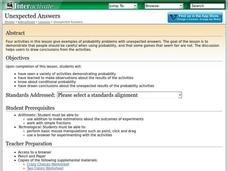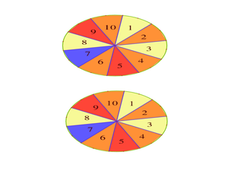Curated OER
Probability: Grade A
Math whizzes explore dependent and independent outcomes. They determine the outcome of simple and compound events. Pupils complete tree diagrams to identify outcomes. They identify fair and unfair games. This two-page worksheet contains...
CK-12 Foundation
Counting Events: Flipping Unfair Coins
Who said life was fair? An interactive uses an area diagram to represent the probabilities of flipping unfair coins. Pupils use the diagram to calculate the probabilities of outcomes of flipping the two coins. The scholars must decide...
EngageNY
Making Fair Decisions
Life's not fair, but decisions can be. The 17th installment of a 21-part module teaches learners about fair decisions. They use simulations to develop strategies to make fair decisions.
Curated OER
Probability
Second graders experiment with probability. In this probability lesson plan, 2nd graders pick colored beans from a bag to find the chance of getting different colors. They make fair and unfair spinners and record the data after spinning...
EngageNY
Fair Games
What constitutes a fair game? Scholars learn about fair games and analyze some to see if they are fair. They extend this idea to warranties and other contexts.
Curated OER
Mathematics of Fair Games
Students examine mathematicians' notion of fairness in games of chance. They work in pairs to perform three different experiments using macaroni and paper bags. They record their results on charts and compare their data.
Curated OER
Probability and Fairness
Students discover how to use the probability of winning to determine if a game is fair or not. In this probability instructional activity, students watch a video and analyze the probability of winning and losing different versions of...
Curated OER
Unexpected Answers
Students explore the concept of fairness. In this fairness lesson plan, students play four probability games. Students determine who has the best chance of winning each of the four games. Students discuss which games gave an unfair...
Curated OER
The Fair Factor
Students participate in playing many games to determine if they are fair or not. They create their own game that is fair to play with their classmates.
Curated OER
Calculating and Applying Basic Probability
Eighth graders investigate the basic concepts of probability. In this probability lesson, 8th graders learn the associated probability. They work with spinners, colored cubes in a bag, flip coins, and choose colored candies while they...
Curated OER
Do You Feel Lucky?
Young scholars explore probability by using games based on probable outcomes of events. They name all of the possible outcomes of an event and express the likelihood of such an event occurring.
Curated OER
Analyze This
Sixth graders use a video and the internet to determine whether a game is fair or unfair. In this probabilities lesson plan, 6th graders determine the fairness of a game based on the probabilities of the outcomes.
Curated OER
Fairness
Students explore and discuss the concept of fairness and what all is involved when your trying to be fair to everyone around you along with your family. They analyze why fairness is an ethical value that is hard to define clearly....
Curated OER
Study of Chance
Seventh graders determine the fairness of various games. In this determining the fairness of various games lesson, 7th graders use spinners, dice, and rock,paper, scissors to play various chance games. Students determine if each game...
Curated OER
Problem-Solving Application: Use Probability
In this spinner probability worksheet, students read one story problem about a spinner game and how fair it is. Students answer 4 short answer questions about solving this problem.
Curated OER
The Game of Chance
Third graders use manipulatives to determine the probability of outcomes. In this probability lesson, 3rd graders roll dice and use spinners to determine the probability of outcomes. They determine if games are fair/unfair based on their...
Curated OER
The Color Spinner
In this probability worksheet, 4th graders look at a spinner and figure out the odds of the spinner hitting each space. They answer 9 short answer questions.
Curated OER
Justice, Is it Fair?
Fifth graders investigate conflict resolution through the study of justice. In this justice lesson, 5th graders are put in scenarios of unfair conditions. Students discuss the unfair situations and their feelings about them. Students...
Curated OER
The Colored Cube Question
Fourth graders examine how to determine the probabilities or likelihood of outcomes. They complete trials to determine probability while using different manipulatives. They determine how games can be made fair or unfair in this unit of...
Curated OER
Mathematics of Fair Games
Students study about mathematicians' notion of fairness in games of chance. They work in pairs to perform three different experiments using macaroni and paper bags. They record their results on charts and discuss the fairness of the games.
Curated OER
"I Want a Wife" by Judy Brady
The classic short essay "I Want a Wife" will probably surprise your class. After all, the way Judy Brady presents it, who wouldn't want a wife? After your readers complete the text, present them with this two-page document. Eight...
Mathalicious
On Your Mark
With many factors leading to a great athlete, does height make Usain Bolt unfairly fast? Middle schoolers conduct analysis to change the running distance of the Olympic races to be proportional to the height of the participants. They...
Curated OER
Investigation-Design Your Own Spinner
Students design their own spinner that meets the given criteria. In this math lesson, students discuss biased versus unbiased events or outcomes when dealing with probability. Students are given 5 criteria that must be incorporated into...
Curated OER
Investigation - Design Your Own Spinner
Seventh graders use ideas of uncertainty to illustrate that mathematics involves more than exactness when dealing with every day situations. The main standard of this instructional activity is statistics and probability.

























